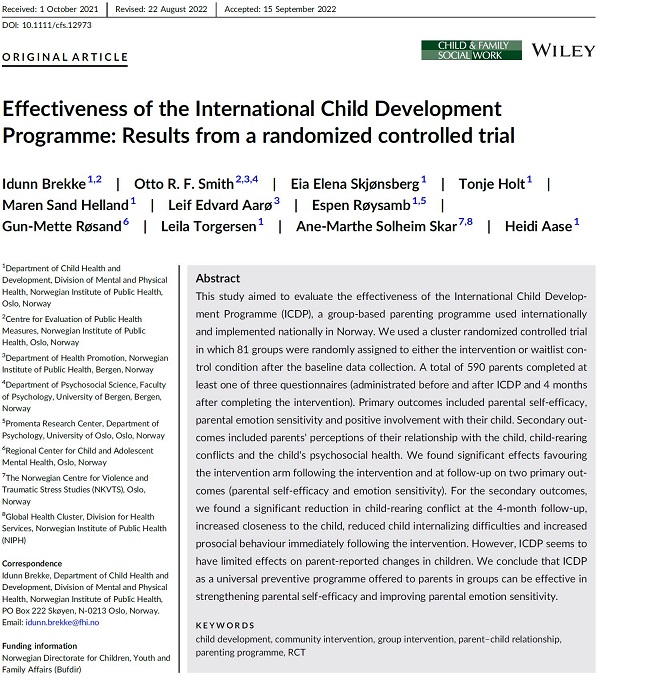This study investigated the effects of the group-based parental guidance programme, the International Child Development Programme (ICDP), in Norway. The study was initiated by the Norwegian Directorate for Children, Youth and Family Affairs (Bufdir). ICDP was developed in Norway in the 1980s and is currently being used in more than 50 countries worldwide. In Norway, ICDP parental groups are provided by the government as a universal, free-of-charge and voluntary intervention offered to parents of children aged 0–18 years (Hundeide & Armstrong, 2011). In Norway, ICDP is implemented by Bufdir and is available free of cost to all parents on a voluntary basis.
The overarching objective of the study was to gain knowledge about the effect of the universal ICDP parenting programme in Norway using an RCT design that included three measurement points, validated instruments and a larger study sample than previously used. More specifically, its aim was to examine changes in the parents, the parent–child relationship and the child. A total of 590 parents completed at least one of three questionnaires that were administrated before and after ICDP and 4 months after completing the intervention. The ICDP groups were recruited from all across Norway during the period from January 2017 until October 2020, and data were collected until May 2021.
Click here to read the full article published in the journal “Child and Family Social Work”:
Effectiveness of the International Child Development Programme: Results from a randomized controlled trial
Idunn Brekke,Otto R. F. Smith,Eia Elena Skjønsberg,Tonje Holt,Maren Sand Helland,Leif Edvard Aarø,Espen Røysamb,Gun-Mette Røsand,Leila Torgersen,Ane-Marthe Solheim Skar,Heidi Aase
First published: 02 October 2022 – lin to the article https://doi.org/10.1111/cfs.12973
Abstract
This study aimed to evaluate the effectiveness of the International Child Development Programme (ICDP), a group-based parenting programme used internationally and implemented nationally in Norway. We used a cluster randomized controlled trial in which 81 groups were randomly assigned to either the intervention or waitlist control condition after the baseline data collection. A total of 590 parents completed at least one of three questionnaires (administrated before and after ICDP and 4 months after completing the intervention). Primary outcomes included parental self-efficacy, parental emotion sensitivity and positive involvement with their child. Secondary outcomes included parents’ perceptions of their relationship with the child, child-rearing conflicts and the child’s psychosocial health. We found significant effects favouring the intervention arm following the intervention and at follow-up on two primary outcomes (parental self-efficacy and emotion sensitivity). For the secondary outcomes, we found a significant reduction in child-rearing conflict at the 4-month follow-up, increased closeness to the child, reduced child internalizing difficulties and increased prosocial behaviour immediately following the intervention. However, ICDP seems to have limited effects on parent-reported changes in children. We conclude that ICDP as a universal preventive programme offered to parents in groups can be effective in strengthening parental self-efficacy and improving parental emotion sensitivity.

